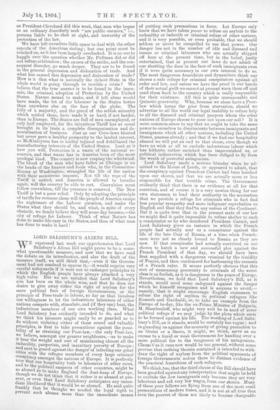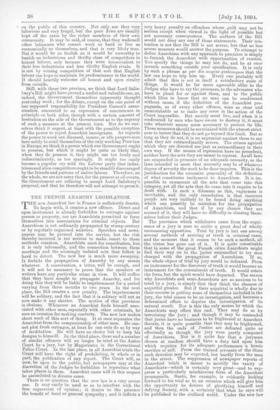LORD SALISBURY'S ALIENS BILL.
WE expressed last week our apprehension that Lord Salisbury's Aliens Bill might prove to be a some- what questionable measure, and now that we have read the debate on its introduction, and also the draft of the measure itself, we still think that,—even if the Govern- ment had not resolved to oppose it,—it would require very careful safeguards if it were not to endanger principles to which the English people have always attached. a very high value. But we are satisfied that Lord Salisbury's aim has been on the whole wise, and that he does not desire to give away either the right of asylum for the mere political foes of foreign Governments, or the principle of Free-trade in labour, so far as that involves our willingness to let the industrious labourers of other nations compete with, stimulate, and (if they can) beat, the industrious members of our own working class. What Lord Salisbury has evidently intended to do, and what we think his measure might easily be so guarded. as to do without violating either of these sound and valuable principles, is first to take precautions against the possi- bility of so straining our Poor-law,—the only Poor-law, we believe, amongst our, greater neighbours,—as to make it bear the weight and coat of maintaining almost all the imbecility, pauperism, and insanitary poverty of Europe ; and next to guard against the dangef of infecting our great cities with the refugee members of every large criminal conspiracy amongst the nations of Europe. It is perfectly true that our hospitality both to labourers of other races, and. to the political suspects of other countries, might be so abused as to make England the dust-heap of Europe, though we do not think that it either is so abused at pre- sent, or even that Lord Salisbury anticipates any imme- diate likelihood that it would be so abused. He said quite frankly that he thought we needed the legal right to prevent such abuses more than the immediate means of putting such precautions in force. Let Europe only know that we have taken _power to refuse an asylum to the unhealthy or imbecile or criminal refuse of other nations, and it is very possible, or even probable, that we should. seldom or never be compelled to use that power. Our danger lies not in the number of idle and diseased and insane or criminal labourers who are actually shipped off here at the present time, but in the belief, justly entertained, that at present our laws do not admit of our shutting the door in the face of such immigrants even if it were quite necessary in our own interest to do so. The most dangerous Anarchists and dynamiters think our shores a safe refuge for criminal conspirators against all order and law, and. unless we have the proof in our hands of their actual guilt we cannot at present warn them off and send them back to the country which is really responsible for their existence. All this is quite unreasonable and. Quixotic generosity. Why, because we alone have a Poor- law which keeps the poor from starvation, should we advertise to all the world our legal inability to refuse help to all the diseased and criminal paupers whom the other nations of Europe choose to pour out upon our soil ? It is mere common-sense to say that we ought to take the same power to ourselves to discriminate between immigrants and. immigrants which all other nations, including the United States, possess already ; and that if we find our hospitality abused we will put an end to that abuse, even though we have no wish at all to exclude industrious labour which has hitherto rather enriched than impoverished us, or political indiscretion which has been obliged to fly from the wrath of powerful antagonists. Lord Salisbury made a serious blunder when he ad- mitted to the House of Lords, or appeared to admit, that the conspiracy against President Carnot had been hatched upon our shores, and that we are actually more or less responsible for that terrible crime. The Government evidently think that there is no evidence at all for that assertion, and. of course it is a very unwise thing for our own statesmen to lend their authority to the accusation that we provide a refuge for criminals who in fact find less popular sympathy and more indignant reprobation on English soil than they find'in any nation of the Continent. But it is quite true that in the present state of our law we might find it quite impossible to refuse shelter to such a conspirator as he who murdered President Carnot, and Lord. Salisbury gives an instance in which the French people had actually sent us a conspirator against the life of the late Czar of Russia, at a time when French- men were not so closely bound to Russia as they are now. If that conspirator had actually contrived on our shores to hatch a new and successful plot against the French President of that day, we should have been first supplied with a dangerous criminal by the timidity of France, and then condemned for harbouring the assassin of a French ruler. It seems perfectly obvious that this sort of unmeaning generosity to criminals of the worst class is as foolish, as it is dangerous to the peace of Europe. Nevertheless, we hold. that Lord Salisbury's Bill, as it stands, would need some safeguard against the danger which he himself recognises and is anxious to avoid,— namely, that it might encourage English statesmen to refuse the right of asylum to political refugees like Kossuth and Garibaldi, or, to take an example from the Europe of to-day, like the ex-Prime Minister of Bulgaria, M. Stambouloff, who might very well be in need of some political refuge if we may judge by the plots which seem to be formed against his life. The wording of Lard Salie- bury's Bill, as it stands, would be certainly too vague ; and in guarding us against the necessity of giving protection to an Orsini or a Santo, it might, we think, serve as an excuse to a timid or weak Government for handing over a mere political foe to the vengeance of his antagonists. Clause 6 as it runs now would be too general, without some proviso that nothing therein contained is intended. to with- draw the right of asylum from the political opponents of foreign Governments unless there be distinct evidence of the practical Anarchism of such refugees. We think, too, that the third clauie of the Bill should have been guarded against any interpretation that might be held to exclude the Jew immigrants only because they are very laborious and ask very low wages, from our shores. Many of these poor fellows are flying from one of the most cruel persecutions of modern times, and it is not at all true that even the poorest of them are likely to become chargeable • on the public of this country. Not only are they very laborious and very frugal, but the poor Jews are usually kept off the rates by the richer members of their own community. It may be said, of course, that they undersell other labourers who cannot work as hard or live as economically as themselves, and that is very likely true. But it would be as foolish as it would be unworthy to banish an industrious and thrifty class of competitors in honest labour, only because they were inconvenient to their less industrious and less thrifty English rivals. It is not by vetoing competition of that sort that English labour can hope to maintain its predominance in the world. It should heartily welcome all honest and open rivalry from outside.
Still, with these two provisos, we think that Lord Salis- bury's Bill might have proved a useful and valuable one, as, indeed, the Government themselves apparently thought yesterday week ; for the debate, except on the one point of our supposed responsibility for President Carnot's assas- sination, amounted to an expression of concurrence in principle on both sides, though with a certain amount of hesitation on the side of the Government as to the urgency of such a measure at the present time. Nor do we our- selves think it urgent, at least with the possible exception of the power to reject Anarchist immigrants. As regards the power to weed out diseased, insane, or idle paupers sent here solely to avail themselves of the only working Poor-law in Europe, we think it a power which our Government ought to possess, but which it might be quite as likely that, when they do possess it, they might use too freely and indiscriminately, as too sparingly. It might too easily become a popular cry with the Labour party that indus- trious and alien competitors ought to be steadily discouraged by the friends and patrons of native labour. Therefore, on the whole, we are not sorry that, for the present at all events, the Government are refusing to accept Lord Salisbury's proposal, and that he therefore will not attempt to press it.



































 Previous page
Previous page